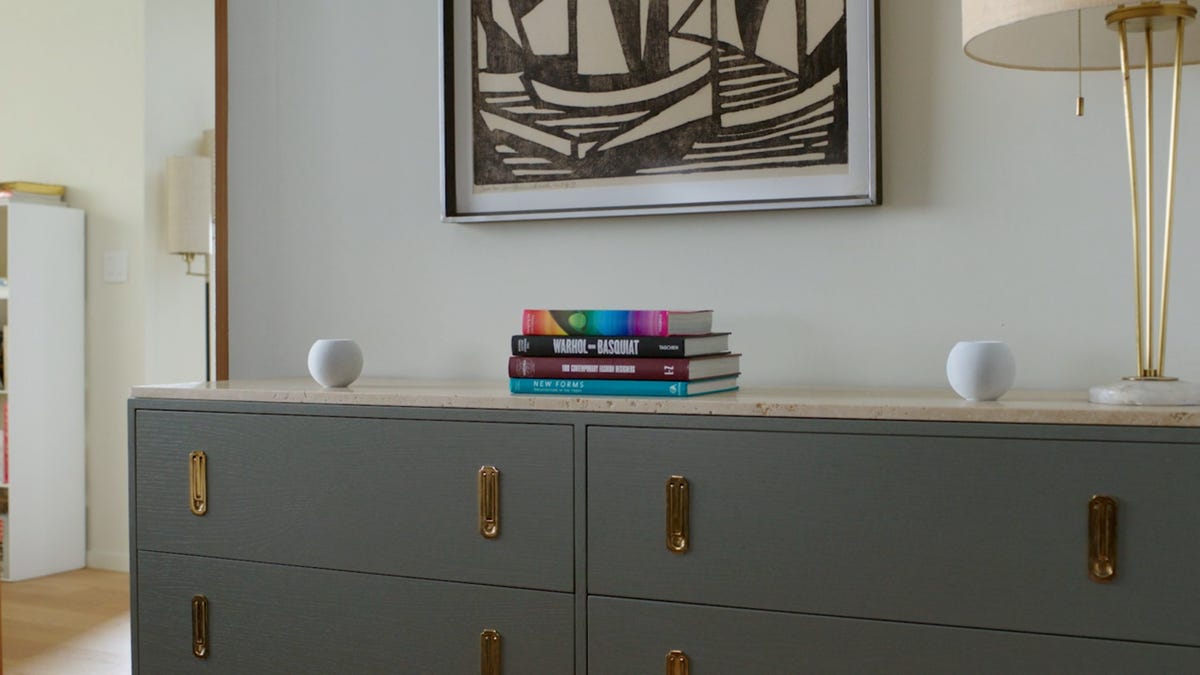 Why You Can Trust CNET
Why You Can Trust CNET HomePod Mini is Apple's smaller, smarter, $99 smart speaker
Everything we know about the more affordable Apple smart speaker and how it could stack up against competitors Amazon and Google.

Update, Nov. 12: Read our HomePod Mini review.
After months of rumors and speculation, Apple on Tuesday announced a new, smaller smart speaker called the HomePod Mini at its iPhone-centered event.
Apple's HomePod debuted in 2018 with a $349 price tag, great sound and the risk of putting white rings on your tabletop. Since then, despite some handy iterations on the HomePod's features via periodic software updates, Apple hasn't made much progress in the smart home, even as Amazon and Google continue to expand their audiences for Alexa and Google Assistant products across the board. That changed today with the reveal of a smaller, smarter speaker.
How big is the HomePod Mini?
The HomePod Mini is significantly smaller than its predecessor. Wrapped in a mesh fabric, it measures 3.3 inches tall and 3.9 inches wide (84 by 98 mm) and weighs 0.76 pounds (345 grams). By comparison, Amazon's new, similarly spherical fourth-gen Echo Dot is 3.5 inches tall, and Google's puck-shaped Nest Mini is 1.65 inches tall.
Like the original HomePod, the Mini features a backlit touch surface for volume and Siri controls. It will be available in white and space gray, priced at $99 (£99, AU$149). That's the same price as the newest (also spherical) Amazon Echo and Google's brand new Nest Audio, both of which are larger than the HomePod Mini.
What does the HomePod Mini sound like?
A smaller speaker likely means sound quality will be less impressive than the stellar original HomePod (we'll test that out in our upcoming review). Apple did equip the HomePod Mini with what it calls computational audio, however. That means it can retune itself over 180 times per second to optimize loudness and dynamic range. Google's Nest Audio and Nest Minis perform similar real-time audio tuning, thanks to their machine learning chip.
Streaming services for the HomePod Mini will include Apple Music, Apple Podcasts, iHeartRadio, Radio.com and TuneIn at release. Pandora and Amazon Music are slated for a future update, although Spotify was conspicuously missing from Apple's presentation. The two companies are embroiled in an antitrust investigation in Europe, sparked by a Spotify complaint filed last year.
Other notable sound features include support for multiroom audio and stereo pairing for two HomePod Minis, which is common for other smart speakers. Two HomePod Minis can also be paired to your Apple TV for surround sound, similar to pairing two Echo Studio speakers and a Fire TV.
What does the HomePod Mini add to HomeKit?
HomePod Mini brings a few new smart home features to HomeKit. Apple announced an Intercom feature that, like Drop In on Amazon and Broadcast on Google smart speakers, allows you to send a voice message from one speaker to another, or to multiple rooms. Other household members can also ask Siri to send a reply to the broadcast.
What's impressive about Apple's Intercom system is the variety of devices it can reach. Intercom messages also work with iPhone , iPad , Apple Watch , CarPlay and AirPods. While you can use Google's Broadcast from a phone, you can't broadcast to one and Amazon is out of the game completely with no Alexa-based phone.
HomePod Mini in space gray.
CarPlay and the HomePod Mini work together to populate things like navigation based on your latest voice searches. The HomePod Mini also works with your iPhone to give you one update across all your apps with one voice command.
When it comes to privacy, Apple promises that nothing you say is sent out of your home until you tap for Siri or reach out via voice. You can also choose whether Apple saves your audio recordings. Personal requests will only work when your iPhone is at home with you, and requests are saved with Anonymous ID.
See also
Ultra Wideband
Apple continues to focus on convincing consumers that its products will respect the privacy of their owners. Apple added a U1 chip to last year's iPhone 11, and today we got a better look at what that chip means for smarts and security around your home.
The U1 chip enables Ultra Wideband communication between equipped devices, including the new HomePod Mini. UWB measures the distance between two devices by calculating the time it takes for a radio wave to pass between them. This method is much more precise than Bluetooth and Wi-Fi.
Ultra Wideband can not only precisely locate items, but it can also communicate data. What that means for HomeKit isn't clear yet, as Apple didn't have anything to say about UWB and smart home devices. In addition to the U1 chip, the HomePod Mini also works with Bluetooth, Wi-Fi 4 and Thread, a network protocol for low-power IoT devices.
Still Siri
Even with a new design, price improvement and smarter software, there's still the issue of Siri as an assistant. Compared to the ever-evolving and personable voice assistants from Google and Amazon, Siri falls short.
Interactions just feel less natural, and often simple requests aren't handled as seamlessly as Google or Alexa. Apple has improved Siri over the years, but even still, we've spent hours with all three and discovered there are some things Siri just can't do.
The HomePod Mini will be available to order beginning Nov. 6, with availability starting the week of Nov. 16. Keep an eye on CNET for a full review of Apple's latest smart speaker, comparisons with its competitors and more in the coming days.

